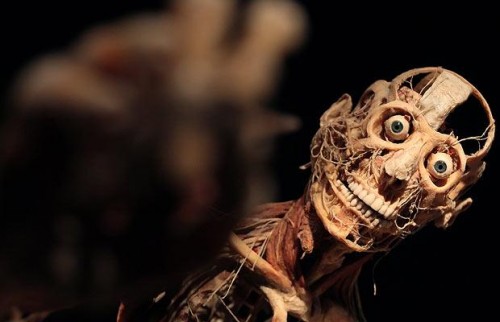The woman who had died was young, her end sudden and tragic. She had fallen from a yacht and drowned. The funeral was big, loud and emotional. In the days following, many came on their own to lay flowers quietly on her grave. One weekday lunchtime a man was depositing a cellophane-wrapped bunch when he was joined by a woman with an elaborate circular arrangement.  As she lowered it, he saw that it depicted a life ring.
As she lowered it, he saw that it depicted a life ring.
“That’s… quite something.”
“It’s what she would have wanted.”
Those words explain why the disposal of dead humans has never attracted the officious intervention of legislators: because we do what our dead would have wanted. It’s a matter of respect and self-respect. It’s almost a cliché. We are not generally malfeasant in this area so there’s no pressing need to regulate us. Nor undertakers. And dead humans pose no threat to bio-security. Contrast that with things down on the farm.
Dead humans pose no threat to biosecurity
Your prize bull dies on Tuesday. You must arrange for an appointed person to come and take him to a designated place for disposal.
Your dad dies on Thursday. No need to call an undertaker. You can bury him on your own land.
If livestock dies on your farm, burial or burning is not permitted. You must instead arrange for fallen farm animals – including stillborn animals – to be collected by an approved transporter and transported for disposal or an approved treatment to a knacker, hunt kennel, maggot farm, incinerator or renderer. [Source]
When bad things happen
Once in a blue moon something so bad happens that it provokes a bout of a tightening up. In the wake of Dr Shipman the cremation forms were reframed. But in many other areas our overseers are snoozing on the job. ID checks are restricted to the coffin plate. If HM Passport Office took this view we’d be able to present ourselves at border control with our name scribbled on a label stuck to our coat. There is, of course, no material advantage to be gained from bringing the wrong dead person to their funeral; to do so is sloppy, not malevolent.
And in any case, mistakes rarely come to light, because the revealed corpse has no part to play at most British funerals. It’s a matter of trust that the right person is in the box — or that anyone is. Which sort of sets you wondering whether an empty coffin would not be perfectly adequately symbolic on its own; does it actually need human contents?
In law the dead have very few rights, largely because they are mostly treated well enough not to need to have to have them spelled out.
Surely there’s a law against it
Occasionally, though, something happens that makes you think surely there must be a law against it.
And do you know, there probably isn’t.
Take the the Marchioness disaster back in 1989. Remember it? The Marchioness was a pleasureboat that collided in the Thames with a dredger, the Bowbelle. 51 people were drowned. In order to aid identification, the hands of many victims were cut off and taken away for fingerprinting without the knowledge or agreement of their families. In one case the hands went astray only to be found four years later in a freezer. To this day those families do not know if their dead person was buried with or without their hands or with the wrong hands.
The families brought an action under Article 8 of the European Convention on Human Rights but it was time expired, or, as the legal people have it, inadmissible ratione tempori. Had the case gone ahead, English common law would have been properly scrutinised by judges in Strasbourg. A good thing it might have been, too, because the position in English common law is staggering:
“No cause of action lies in tort in relation to the mutilation of the body of a family member.” [Source] What are the ramifications of that?
You’re not allowed expose a dead person in such a way as to outrage public decency. And you are not allowed to let your dead person to become a hazard to public health. But as far as I can see — and here’s where I appeal to you to correct me if you can — the only other bad thing you’re not allowed to do to a dead person is (sorry) sexually penetrate them. Even here, in the Sexual Offences Act 2003, the focus is not so much the protection of the dignity of the dead as the compilation of a comprehensive directory of activities constituting a sexual offence. So Section 70 of the Act, Sexual penetration of a corpse, appears between S69 Intercourse with an animal and S71 Sexual activity in a public lavatory. The most you can get for it, by the way, is 2 years.
Dead people are not worthless
The historic English common law position that there is no property in a corpse is obviously obsolete. A dead person nowadays is imbued with all sorts of potential value, whether as a teaching aid to medical students, a contributor to medical research, a donor of tissues and organs or as an exhibit in an anatomical exhibition. There is statutory recognition of this. You don’t own your body but you can donate your corpse to medicine or science, and you can also donate body parts (Human Tissue Act 1961, Anatomy Act 1984 and Corneal Tissue Act 1984). What’s more, your personal representative can, too, so long as there is nothing to say that you never wanted this, and provided family family members don’t object.
The dead can now be preserved long-term and, though the painter Robert Lenkiewicz could arguably have been prosecuted for preventing the lawful and decent burial of his friend, the tramp Diogenes, he was allowed to keep him in his preserved state. Diogenes is still with us. Indeed, we hope to bring him to next year’s Ideal Death Show.
In brief, then, you can make certain plans for your body after your death, just as you can donate blood and kidneys when alive. You can’t sell em, though. Just as you can’t sell your hair — legally, that is. Who’d stop you?
What about what they say they want?
Funeral instructions have never been legally binding under common law. Mum said she wanted to be buried? Tough, we’re going to bury her. Not a problem.
Three recent laws make it possible to overrule a problem personal representative in the interest of enabling a dead person to have their way with their funeral wishes. The first is the Senior Courts Act 1981 S116. The second is Article 8 of the Human Rights Act 1988, which has been invoked by one judge when pronouncing that funeral wishes are binding on personal representatives (Borrows v HM Coroner for Preston [2008]), but dismissed by another judge on the grounds that dead people don’t have human rights (Ibuna v Arroyo [2012]). Article 9 of the Human Rights Act 1988 may or may not uphold the funeral wishes of those with strong religious beliefs who expect to be disposed of in accordance with those beliefs. The law has yet to be tested.
If judges can’t agree how to interpret the law it is because the best way forward is anything but clear-cut. If funeral instructions were to be made legally binding, they would have to be reasonable, and who is to be the judge of that?
For this and for other reasons our legislators are not motivated to act with urgency to create a legal framework for modern times. Cases rarely come to court. Even though an increasing number of funerals are subject to buggering-up tactics by disgruntled family members and former lovers, people muddle through. Cases of mutilation are extremely rare. I’m not aware of a single prosecution for necrophilia.
So far as the law is concerned, dead people’s rights is a matter of move along, nothing to see here. All because 99.9% of us do what they would have wanted.



Not ignoring this…just cogitating and absorbing.
99.9% do “what they would have wanted”. Does anybody have a statistic for how many actually discussed or wrote down what they wanted?
That’s where the ‘would have’ comes from, I guess, Melissa. In any case, if I write down that I’d like you to give me a loom band for my birthday I’m hardly likely to object if you give me a Bentley (though I’d worry where the money came from). Brits are culturally self-deprecating; many deserve better funerals than they ask for. I don’t buy this ‘we don’t know what to do cos he never said’. You never hear it said at Christmas, and no one ever paid any attention to ‘don’t bother about me, there’s nothing I need’.
Is, ‘What they would have wanted’ the best place to start with a funeral arrangement ? Only 30% of us make a will, in which one of the first statements will often be, I desire to be buried/cremated, but rarely offer further guidance. As Melissa says, fewer have had ‘the conversation’ with their relatives and friends than those left to fulfill the funeral arrangements might like. The aged, wise and non religious who will speak of this oft counsel, ‘I don’t mind, you decide, because I won’t care so much.’ Is that such a bad thing ? The funeral ritual… Read more »